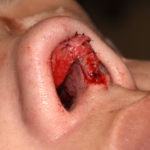The use of antibiotics in any form of surgery is ubiquitous. To decrease the risk of postoperative infection the administration of antibiotics, both intravenously during surgery as well as orally after surgery, is widely practiced and believed to be effective. This is certainly true in rhinoplasty surgery. Fear of infection is understandable given that nose surgery is far from being a sterile procedure with proximity to the nasal cavity and maxillary sinuses.
Occasionally a patient will ask if they have to have antibiotics for their rhinoplasty surgery. The following paper provides one perspective on that question from a clinical study standpoint.

Their study results failed to detect a lower rate of postoperative infections in patient given antibiotics for their rhinoplasty surgery. In essence the use of antibiotics does not completely eliminate all infection occurrence.
This is not the first study that has been done that challenges the concept of always giving antibiotics in some type of elective plastic surgery. What it indicates is that in the vast majority of rhinoplasty procedures antibiotics don’t really have any benefit because the overall infection risk of the procedure is so low. But it also does not account for the rare unfortunate patient who develops a postoperative infection that may have otherwise been prevented with antibiotic use.
Dr. Barry Eppley
Indianapolis, Indiana


